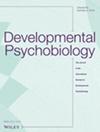New Mothers’ Experiences of Childhood Adversity and Current Context of Economic Adversity Predict Parent and Infant RSA
Abstract
This study examined the pathways from mothers’ adverse childhood experiences (ACEs) to infants’ respiratory sinus arrhythmia (RSA), testing potential mechanisms of current contextual risk, maternal RSA, and parenting in accounting for the intergenerational transmission of adversity. Participants were 200 first-time mothers and their infants living in low-income contexts. Mothers reported on ACEs and contextual risk (economic insecurity, cumulative risk) during their pregnancy (T1). Observed parenting behaviors and mothers’ and infants’ baseline RSA were obtained when the infants were 2–4 months of age (T2) and 4–6 months of age (T3). The results from path analyses showed that mothers’ experiences of ACEs were related to higher current economic insecurity and cumulative risk. Higher current economic insecurity predicted lower baseline RSA at T2 in infants but not in mothers, whereas mothers’ report of ACEs predicted lower maternal baseline RSA at T2. Higher maternal baseline RSA at T2 predicted relative increases in infant RSA from T2 to T3. Maternal responsiveness was unrelated to ACEs and current contextual risk but predicted relative increases in infant baseline RSA from T2 to T3, indicating an independent effect of parenting. The findings highlight potential pathways for the intergenerational transmission of experiences of adversity. Mothers’ own experiences of adversity as a child may impact a psychophysiological substrate of emotion regulation of infants through current economic insecurity and maternal emotional regulation, whereas maternal parenting appears to independently support a correlate of infant regulation.

 求助内容:
求助内容: 应助结果提醒方式:
应助结果提醒方式:


